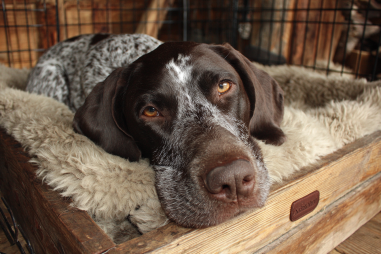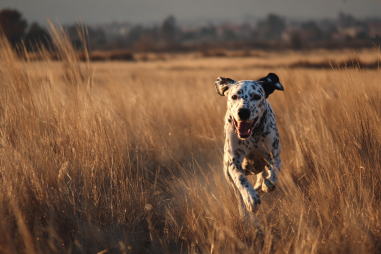Pointer dogs are known for their energetic, intelligent, and affectionate nature. As a breed originally bred for hunting, Pointers are naturally active and curious, requiring both physical exercise and mental stimulation to stay happy and healthy. However, like any dog breed, Pointers can develop certain behavioral problems if their needs are not met or if training and socialization fall short. Understanding these common challenges and knowing how to address them is key to raising a well-behaved, balanced Pointer that is a joy to live with.
Overview of Typical Pointer Behavior
Pointers are medium to large-sized sporting dogs with a strong instinct for pointing and retrieving game. They are highly energetic and love to be outdoors, often eager to run, jump, and explore. Their intelligence makes them quick learners but also means they can get bored easily if not challenged. Typically, Pointers are friendly and social dogs, forming strong bonds with their family members and often getting along well with other pets. However, their hunting instincts and high energy levels sometimes manifest in behaviors that owners might find problematic, especially if these impulses are not properly channeled.
Because of their history and temperament, Pointers thrive in environments that provide plenty of physical exercise, mental stimulation, and consistent training. Without enough activity or structure, Pointers might develop behavioral problems, which can include excessive barking, destructive chewing, and digging. Recognizing these behaviors as signals rather than just nuisances helps owners address the root causes effectively.
Common Problems: Excessive Barking, Chewing, Digging
While each Pointer is unique, some behavioral problems tend to be more common in the breed. Here are some of the most frequent issues owners report:
- Excessive Barking: Pointers may bark to alert their owners of strangers, noises, or other animals. However, excessive barking can become a problem if it happens frequently outside of these contexts or continues for long periods.
- Chewing: Chewing is a natural behavior for dogs, especially puppies, but when Pointers chew on furniture, shoes, or other household items, it can lead to frustration and damage.
- Digging: Many Pointers enjoy digging due to their hunting instincts or just as a way to expend energy. Excessive digging in gardens or yards can be destructive and problematic.
Causes and Triggers
Understanding why these behaviors occur is essential for effectively managing them. Many times, common behavioral problems in Pointers stem from unmet needs or environmental triggers:
- Boredom and Lack of Exercise: Without sufficient daily physical activity, Pointers can become bored and restless, leading to destructive behaviors like chewing and digging.
- Separation Anxiety: Pointers are social dogs who dislike being left alone for long periods, and this can trigger barking and destructive chewing.
- Under-Stimulation: Pointers need mental challenges such as training, puzzle toys, or scent games. Without these, they may seek out their own forms of entertainment, sometimes unwanted ones.
- Environmental Stressors: Loud noises, unfamiliar people, or changes in routine can cause anxiety, resulting in barking or destructive behaviors.
Training and Management Strategies
Addressing behavioral problems in Pointers involves a combination of consistent training, proper exercise, and environmental management. Here are some practical strategies that can help:
Provide Regular Exercise
Pointers need plenty of aerobic activity to burn off excess energy. Daily walks, runs, or play sessions are essential, with at least one vigorous activity like fetch or agility training. Creating a routine that allows your Pointer to expend energy healthily can significantly reduce behavioral problems.
Mental Stimulation
Keep your Pointer’s mind busy with training sessions, puzzle toys, interactive games, or scent work. This helps reduce boredom and encourages positive behaviors, as mental stimulation can be just as tiring as physical exercise.
Consistent Training and Positive Reinforcement
Training should be consistent and based on positive reinforcement techniques. Teaching commands such as “quiet,” “leave it,” and “stay” can help minimize barking and prevent chewing and digging on inappropriate items. Reward calm and focused behavior to encourage them to repeat it.
Provide Appropriate Chew Toys and Digging Areas
Give your Pointer designated chew toys to satisfy their natural urge to chew. For digging, consider creating a specific digging pit or area where your dog is allowed to dig freely. This helps redirect their behavior into a controlled and acceptable outlet.
Address Separation Anxiety
If your Pointer suffers from separation anxiety, gradually train them to feel comfortable being alone by using techniques like short departures, rewarding calmness before leaving, and providing engaging toys during your absence. In some cases, crate training may offer a safe and secure space for your dog.
Environmental Management
Reduce exposure to stressors that trigger unwanted behaviors whenever possible. This might mean using soundproofing, barriers to restrict access to certain parts of the home or yard, or calming products such as aromatherapy sprays or anxiety vests.
When to Seek Professional Help
Sometimes, despite your best efforts, behavioral problems persist or worsen. In these cases, consulting a professional—whether a veterinarian, behaviorist, or accredited dog trainer—can provide targeted solutions. Some behaviors might be linked to medical conditions such as pain or neurological issues, so a veterinary evaluation is a good first step if you see sudden or severe behavioral changes.
A professional dog trainer or behaviorist may help create a customized plan to address your Pointer’s specific challenges, teach you effective training techniques, and guide you in building a stronger bond with your dog. Early intervention often leads to better outcomes and prevents problems from escalating.
Preventative Measures
Preventing behavioral problems is always preferable to managing existing ones. Here are a few important preventative tips:
- Socialize Early and Often: Introduce your Pointer to a variety of people, animals, and environments when they are young to build confidence and reduce fear-based behaviors.
- Stick to a Routine: Dogs benefit from predictable schedules for feeding, exercise, and training, reducing anxiety-induced behaviors.
- Provide Adequate Mental and Physical Outlet: Early identification of your Pointer’s activity level and mental needs helps prevent boredom and frustration.
- Keep Training Consistent: Make training a lifelong process and regularly reinforce good behavior to maintain discipline and structure.
Engaging with your Pointer frequently and positively, while providing physical and mental challenges, can keep behavioral problems at bay. Early attention and proactive approaches go a long way in ensuring your dog grows into a well-rounded and content companion.
By understanding your Pointer’s unique traits and needs, and by applying appropriate training and management strategies, you can overcome common behavioral challenges effectively. This not only improves your dog’s quality of life but also strengthens the bond you share, making your journey together a rewarding one.







